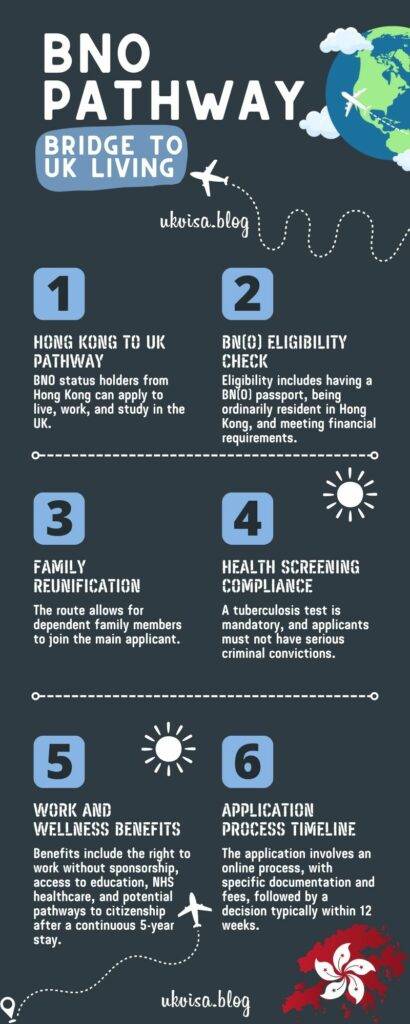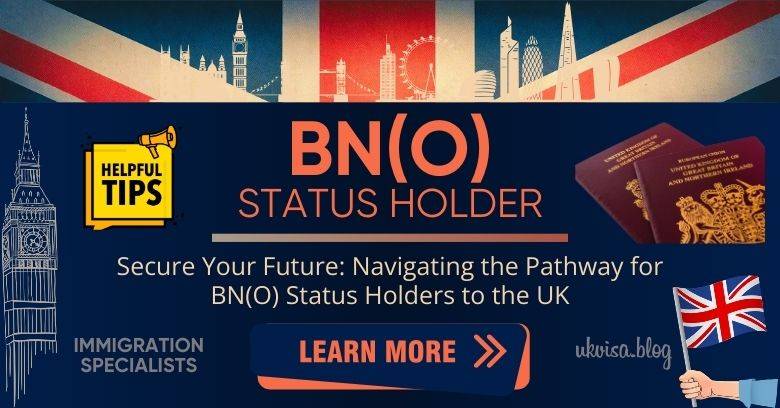Exploring the BN(O) Status Holder Route for Hong Kong Residents! In the wake of significant geopolitical shifts, the BN(O) Status Holder Route emerges as a crucial bridge between the UK and Hong Kong, offering a new beginning for Hong Kong residents with British National (Overseas) status. This route symbolizes hope and opportunity, providing a secure foundation for those looking to establish their lives in the UK. This guide details the eligibility criteria, benefits, rights, and application process under the BN(O) Status Holder Route, providing essential insights for a smooth transition. Understanding this pathway is key for BN(O) status holders planning their future in 2024.
Table of Contents
1. Overview: British National (Overseas) Status Holder Route
The British National (Overseas) or BN(O) status is a distinctive form of British nationality, created during the historical transition of Hong Kong from British to Chinese rule in 1997. This status, while not granting full British citizenship, was a symbol of the UK’s commitment to the people of Hong Kong. With the evolving political climate and growing concerns about autonomy and rights in Hong Kong, the UK government has introduced a new immigration route for BN(O) status holders, reinforcing its dedication to the principles of freedom, democracy, and the rule of law.
Who is Eligible for the BN(O) Status Holder Route?
BN(O) status holders are individuals from Hong Kong who registered for this specific nationality type before 1 July 1997, when Hong Kong transitioned to Chinese sovereignty. It’s important to recognize that not all residents of Hong Kong hold this status. Possessing a BN(O) passport, a key marker of this relationship, does not equate to full British citizenship rights but serves as an official travel document.
In a significant shift from its original stipulations, the BN(O) status now opens new avenues for holders. The recent introduction of the BN(O) Status Holder Route allows BN(O) passport holders to apply to live, work, and study in the UK. This policy change is a response to the current issues in Hong Kong and signifies the UK’s commitment to its historical obligations and the protection of democratic values. It provides BN(O) status holders with a crucial lifeline and reassurance about their future amid the uncertainties in their home territory.
Conclusion: BNO Status Holder Route
The BN(O) Status Holder Route stands as a testament to the enduring bond between the UK and Hongkongers, offering a pathway to safety and new opportunities for those eligible under this unique category of British nationality.

2. Eligibility Criteria for BN(O) Status Holder Route
The UK’s BN(O) Status Holder Route, embodying its commitment to democracy and freedom, sets specific criteria for BN(O) status holders. This section outlines these requirements and highlights how they differ from the original BN(O) citizenship.
BN(O) Status Holder Route Requirements
- BN(O) Passport
- Must possess a valid BN(O) passport, not necessarily during application, but before the visa decision.
- Residency
- Applicants should be ordinarily resident in Hong Kong, including those currently in the UK but usually residing in Hong Kong.
- Dependent Family Members
- Includes dependent children under 18, a spouse, or a civil partner. In some cases, adult children and other dependent family members may be eligible. For details, please refer to BN(O) Household Member Route.
- Financial Requirement
- Demonstration of financial ability to support themselves in the UK for at least 6 months.
- Tuberculosis Test
- A compulsory tuberculosis test from an approved clinic is required.
- Criminal Convictions
- Applicants with serious criminal convictions or posing security concerns may be ineligible.
Differences Between BN(O) Citizenship and New Visa Route
- BN(O) Citizenship
- Initially, it offered a BN(O) passport without full British citizenship rights, limiting residence and work in the UK.
- BN(O) Status Holder Route
- Now permits living, working, and studying in the UK, with a pathway to settlement after five years and potential British citizenship thereafter.
Conclusion: BNO Status Holder Route Requirements
The BN(O) Status Holder Route marks a significant transformation from the symbolic BN(O) citizenship to a more substantive opportunity, offering a path to settlement and citizenship in the UK. This evolution of the BN(O) status underlines the UK’s ongoing commitment to the people of Hong Kong, extending them tangible support and opportunities amidst changing global dynamics.
3. Benefits & Rights of BN(O) Status Holders
The BN(O) Status Holder Route extends beyond a mere visa, symbolizing the UK’s profound commitment to the people of Hong Kong and honoring its historical promises. This route endows BN(O) status holders with various rights and benefits, facilitating their integration and life in Britain.
Rights and Privileges in the UK for BN(O) Status Holders
- Work Rights
- Unrestricted employment rights in any sector and at any level, without requiring a sponsor.
- Access to Education
- Eligibility for schooling for children and higher education opportunities for adults.
- Healthcare Access
- Access to the National Health Service (NHS), offering comprehensive medical care for BN(O) visa holders and their families.
- Path to Settlement
- Opportunity to apply for Indefinite Leave to Remain (ILR) after five continuous years in the UK, leading to permanent settlement.
- Social Benefits
- Access to social welfare benefits in the UK, subject to eligibility criteria.
- Property Ownership
- Freedom to purchase property in the UK, for residence or investment purposes.
Potential Pathways to British Citizenship
After attaining ILR, BN(O) status holders can aim for British citizenship. Following an additional year in the UK (a total of six years), they become eligible to apply for citizenship, provided they meet other criteria like the “Good Character” requirement. This pathway significantly elevates the BN(O) status from a symbolic document to a substantial means for Hongkongers to secure their future and assimilate into British society.
Conclusion: BN(O) Status Holders Rights and Privileges
The BN(O) Status Holder Route offers a comprehensive set of rights and benefits, emphasizing the UK’s dedication to upholding its commitments to Hong Kong’s residents. This route not only facilitates a smoother transition for Hongkongers into British life but also paves the way for their eventual integration as full citizens of the UK.
4. Applying for BN(O) Status Holder Route
The application process for the BN(O) Status Holder Route, while detailed, can be straightforward with the right information and preparation. Here is a comprehensive guide to navigating the process:
Application Process for BN(O) Status Holder Route
- Digital Application Method
- Complete the application online, with the option to use the ‘UK Immigration: ID Check’ smartphone app for submitting biometric information.
- Required Documents
- Valid or expired BN(O) passport
- Valid travel document (e.g., Hong Kong SAR passport)
- TB test results from an approved clinic
- Proof of sufficient financial means
- Details of accommodation in the UK
- Application Fees and IHS
- Application fees: £180 for 30 months, £250 for 5 years
- Immigration Health Surcharge (IHS) for NHS access
- Biometric Information Submission
- Use the smartphone app for biometric submission, or book an appointment at a Visa Application Centre if necessary.
- Decision Timeline
- The decision typically arrives within 12 weeks of submitting the application and required biometrics.
- Visa Issuance
- Successful applicants receive a digital visa linked to their passport, which can be viewed and proved online.
- Potential Challenges
- Ensure accuracy and completeness of documentation.
- Anticipate and plan for potential delays in biometric appointments.
- Understand the digital visa format and seek professional advice if required.
While the BN(O) Status Holder Route application process is designed to be user-friendly, careful attention to documentation and understanding the digital aspects are crucial. Applicants are encouraged to stay informed and seek assistance if they encounter any challenges during the application process.
5. Adjusting to Life in the UK as a BN(O) Status Holder
BN(O) status holders moving to the UK embark on a journey filled with opportunities and responsibilities. This transition to a new cultural and social environment involves embracing British values and adapting to local customs, while also respecting and maintaining one’s heritage.
Responsibilities and Integration Strategies
Expectations and Responsibilities
- Upholding British Values
- Respect for democracy, law, liberty, and diverse beliefs.
- Financial Responsibilities
- Adherence to UK tax obligations.
- Healthcare
- Utilization of NHS services and considering additional health insurance.
Integrating into British Society
- Cultural Immersion
- Participate in local community and cultural events.
- Education
- Exploring educational opportunities for family members.
- Networking
- Joining local clubs and organizations.
- Understanding Local Customs
- Learning about British etiquette and social norms.
- Language Skills
- Improving comprehension of British English and local dialects.
Conclusion: The BN(O) Status Holder Route – A Pathway to New Beginnings
The BN(O) Status Holder Route represents more than a visa option; it is a profound commitment by the UK to uphold democratic values and freedoms. This route offers BN(O) citizens not just a secure future but also a beacon of hope amidst geopolitical changes. It acknowledges the deep historical ties and shared values between Hong Kong and Britain, making the transition a mutually enriching experience.
This pathway is a journey towards new opportunities and growth, inviting BN(O) citizens to be part of the UK’s diverse, culturally rich community. It honors their legacy while promising a future of collective progress and integration into British society.
To access more information and comprehensive details, please consult the Immigration Rules Appendix Hong Kong British National (Overseas).
6. FAQs: BNO Status Holder Route
-
What is British National (Overseas) or BN(O) Status?
BN(O) refers to a special type of British nationality granted to Hong Kong residents. Established in 1985, it was given to those who registered before the handover of Hong Kong to China in 1997.
-
How does the BN(O) Status Holder Route differ from regular immigration routes?
This unique route offers BN(O) status holders and their immediate families a streamlined pathway to live, work, and study in the UK, leading to potential settlement and British citizenship. It’s tailored in response to the recent challenges in Hong Kong.
-
Can family members accompany BN(O) status holders to the UK?
Yes, dependents, including spouses or civil partners and children under 18, can join BN(O) status holders in the UK under this route.
-
What is the duration of stay permitted under the BN(O) Status Holder Route?
BN(O) status holders can choose between a 30-month visa (extendable by another 30 months) or a straight five-year visa.
-
Does this route lead to British citizenship?
Yes, after residing in the UK for 5 years, BN(O) status holders and their dependents can apply for settlement (Indefinite Leave to Remain), and after a further 12 months, they may apply for British citizenship.
-
What are the financial requirements for the BN(O) Status Holder Route?
Applicants need to demonstrate their ability to support themselves financially for at least six months in the UK, without requiring a specific job offer.
-
Can BN(O) status holders access public funds in the UK?
Initially, BN(O) status holders are not eligible for public funds. Access is granted once they achieve settled status after 5 years.
-
Is a valid BN(O) passport necessary for the application?
While a valid BN(O) passport is ideal, applicants can use an expired BN(O) passport or their certificate of registration for the application.
-
What prompted the introduction of the BN(O) Status Holder Route?
The UK government initiated this route to honor its historical commitment to Hong Kong’s people, especially considering the recent challenges to their rights and freedoms in Hong Kong.

